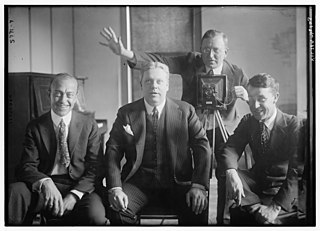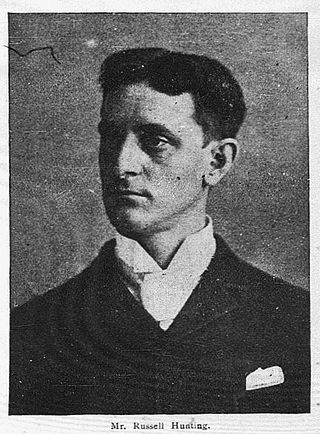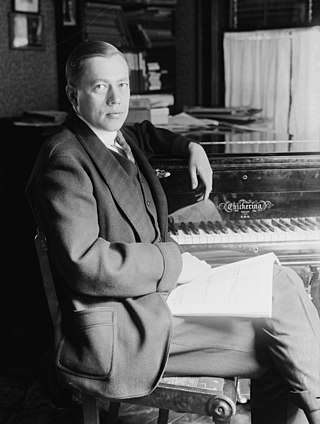Related Research Articles
The Haydn Quartet, later known as the Hayden Quartet, was one of the most popular recording close harmony quartets in the early twentieth century. It was originally formed in 1896 as the Edison Quartet to record for Edison Records; it took its new name when recording for other companies. The name was a homage to Joseph Haydn, the classical composer; the spelling was later revised to Hayden, which reflects the way it was pronounced. The group disbanded in 1914.

The Peerless Quartet was an American vocal group that recorded in the early years of the twentieth century. They formed to record for Columbia Records, where they were credited as the Columbia Quartet or Columbia Male Quartet. From about 1907, when they began to record for record labels other than Columbia, they were more widely known as the Peerless Quartet.

George J. Gaskin was one of the most popular singers in the United States during the 1890s and an early American recording artist.

"White Christmas" is an Irving Berlin song reminiscing about an old-fashioned Christmas setting. The song was written by Berlin for the 1942 musical film Holiday Inn. The composition won the Academy Award for Best Original Song at the 15th Academy Awards. Bing Crosby's record topped the Billboard chart for 11 weeks in 1942 and returned to the number one position again in December of 1943 and 1944. His version would return to the top 40 a dozen times in subsequent years.

Henry Burr was a Canadian singer, radio performer and producer. He was born Harry Haley McClaskey and used Henry Burr as one of his many pseudonyms, in addition to Irving Gillette, Henry Gillette, Alfred Alexander, Robert Rice, Carl Ely, Harry Barr, Frank Knapp, Al King, and Shamus McClaskey. He produced more than 12,000 recordings, by his own estimate, and some of his most popular recordings included "Just a Baby's Prayer at Twilight", "Till We Meet Again" with Albert Campbell, "Beautiful Ohio", "I Wonder Who's Kissing Her Now" "When I Lost You" and "In The Shade Of The Old Apple Tree". A tenor, he performed as a soloist and in duets, trios and quartets.

Russell Dinsmore Hunting was an American comic entertainer, pioneer sound recordist, and an influential figure in the early years of the recorded music industry. He was described as "the most popular pre-1900 recording artist".

Edward Addison Favor, who was billed as Edward M. Favor or Ed. M. Favor, was an American vaudeville comedian, singer and musical theatre performer who was one of the most popular stars of the late nineteenth and early twentieth centuries.

The American Quartet was a four-member vocal group that recorded for various companies in the United States between 1899 and 1925. The membership varied over the years, but the most famous line-up — comprising John Bieling, Billy Murray, Steve Porter (baritone), and William F. Hooley (bass) — recorded for the Victor Talking Machine Company from 1909 to 1913. The same group of singers also recorded for Edison Records as the Premier Quartet, and for that and other labels as the Premier American Quartet. From 1912 to 1914 the quartet also recorded with countertenor Will Oakland as the Heidelberg Quintet.
The Unique Quartette was a black vocal quartet in New York City. Founded in the mid-1880s by Joseph Moore, it is best known for a handful of wax cylinder recordings made in the first half of the 1890s. It is the earliest known black vocal group to have been commercially recorded, with the first recordings made in December 1890 for the New York Phonograph Company.

Frank C. Stanley was a popular American singer, banjoist and recording artist active in the 1890s and the 1900s.

Stephen Carl Porter was an American pioneer recording artist, who recorded prolifically for numerous recording companies in the 1890s and early 1900s. He was also an entrepreneur who helped establish the recording industry in India in the early years of the twentieth century, and successfully marketed a new form of hearing aid.

John W. Myers, who was usually credited as J. W. Myers, was an American baritone singer, who recorded widely in the United States between the early 1890s and early 1917. His recordings, including "Two Little Girls in Blue" (1893), "The Sidewalks of New York" (1895), "Just Tell Them That You Saw Me" (1895), "When You Were Sweet Sixteen" (1901), "On a Sunday Afternoon" (1902), "Way Down In Old Indiana" (1902), and "In the Good Old Summer Time" (1902), were among the most popular of the period.

William B. Shires, who performed and recorded as Billy Golden, was an American blackface comic, and singer who was a popular recording artist between the 1890s and the 1910s.

Reinald Werrenrath was an American baritone opera singer, who also recorded popular songs and appeared regularly on radio in the early decades of the twentieth century. Werrenrath commonly used the pseudonym Edward Hamilton.

Albert Charles Campbell was an American popular music singer who recorded between the late 1890s and the 1920s. He was best known for his many duo recordings with Henry Burr, and as a member of the Peerless Quartet and other vocal groups, but also recorded successfully as a solo singer both under his own name and under various pseudonyms including Frank Howard.

John H. Bieling was an American tenor singer who was a pioneer recording artist in the early years of the twentieth century. He featured on thousands of recordings, especially as a member of The Haydn Quartet and The American Quartet, two of the most popular vocal groups of the period.

William F. Hooley was a British-born American bass singer and pioneer recording artist who was popular as a solo singer, as a monologist, and as a member of several of the most successful vocal groups of the early twentieth century, including The Haydn Quartet and The American Quartet.

Samuel Holland Rous, who recorded using the name S. H. Dudley, and less frequently as Frank Kernell, was an American singer, pioneer recording artist, and music business executive. He was unrelated to the black vaudeville performer and impresario Sherman Houston Dudley.
Walter Bowman Rogers was an American cornet player, concert band and orchestral conductor and composer, who was responsible for most of the orchestral arrangements on recordings made for the Victor Talking Machine Company between 1904 and 1916. He left the Victor Company when he accepted an equity partnership with the Paroquette recording company, a venture which ended when the company went into receivership. He accepted arranging, conducting positions with the Paramount and Emerson companies before he was offered an executive-level position by the Brunswick-Balke-Collander Company when the nationally known manufacturer of bowling, saloon, and phonograph cabinetry decided to expand its operations in the talking-machine industry by creating a line of phonograph recordings. Rogers became Brunswick’s director of classical-music releases, a role he held until shortly before the Brunswick phonograph division was acquired by the Warner Brothers film corporation in April 1930.

Harry Anthony was an American tenor and pioneer recording artist. With James F. Harrison he made several recordings of religious music that were popular at the time. He was known as a solo artist, and also became a member of the American Quartet. He made records for most of the major recording companies of the day.
References
- 1 2 Whitburn, Joel (1986). Pop Memories 1890-1954: The History of American Popular Music . Menomonee Falls, Wisconsin: Record Research, Inc. pp. 293. ISBN 0-89820-083-0.
- ↑ Uncle Dave Lewis, John Bieling, Allmusic.com. Retrieved 24 May 2013
- ↑ "The First Book Of Phonograph Records". archive.org. 4 April 2017. Retrieved 2017-11-16.
- ↑ Vocal Hall of Fame: The American Quartet Archived 2013-10-17 at the Wayback Machine . Retrieved 22 May 2013
- ↑ Randy McNutt, Cal Stewart, Your Uncle Josh: America's King of Rural Comedy, iUniverse, 2011, p.133